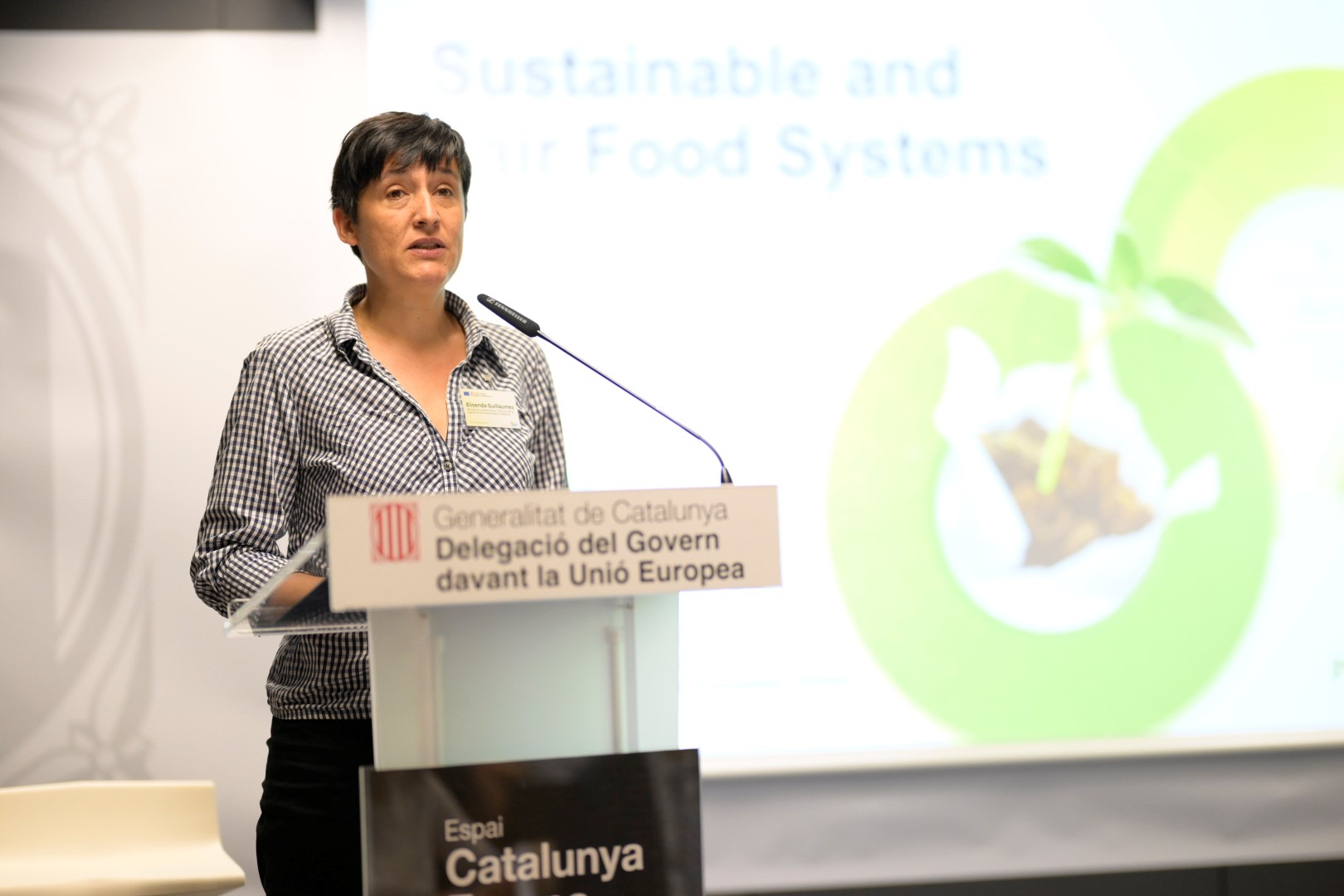- The Delegation of the Government to the EU organised the event 'Sustainable and Fair Food Systems: Reducing the Climate Footprint' for presenting best practices before European regulation of sustainable food systems

The Director General of Agriculture and Livestock of the Department of Climate Action, Food and Rural Agenda, Elisenda Guillaumes, presented in Brussels the Catalan model of Sustainable Agricultural Production (PAS), a system to evaluate and certify the sustainability of the production systems of different farms in Catalonia, taking into account the economic, environmental and social aspects.
Guillaumes explained the implementation of the SAP on Thursday 8 June at the event 'Sustainable Food Systems: Reducing Climate Footprint', organised at the Espai Catalunya Europa of the Government Delegation to the EU and certified by the European Commission as a partner event of the EU Green Week.
Specifically, the Director General shared the results obtained after 39 farms have been positively tested, noting that more than 40% of the 43 environmental sustainability practices proposed by the PAS are already being successfully implemented by Catalan producers. "The aim is to achieve a sustainable agri-food system, because it will be one of our best tools for combating the effects of the climate emergency and moving towards food sovereignty," said Guillaumes.
With regard to the implications of the SAP, Joan Bonany, a researcher at the Institute for Agri-Food Research and Technology of Catalonia, highlighted at the event that it has been developed as a "system that will allow us to evaluate and recognise farms according to their level of sustainability, taking into account economic, social and environmental aspects". In this sense, Bonany explained that the SAP is not intended as a control mechanism over professionals, but as "a tool for improvement, to guide farmers towards a higher level of sustainability".
The Federation of Agricultural Cooperatives of Catalonia (FCAC) also participated in the event through Diana Molina, who positively valued the PAS as a tool "that allows an assessment of the sustainability of agricultural cooperatives and farms". Molina also highlighted the work that the FCAC has been doing since 2019 to accompany cooperatives towards sustainability standards.
The Government's delegate to the EU, Ignasi Centelles, opened the event, stating that "the transformation of food production models is essential. We must evolve towards a model that responds to the challenges of the future". In this sense, Centelles highlighted the role of the SAP as a key tool to be able to evaluate farms and provide the producers with the necessary means to acquire the highest levels of sustainability.
The need for multi-level collaboration
The event was also attended by Rada Chehlarova, head of the "Farm to Fork" strategy team of the European Commission's Directorate-General for Health and Food Safety. "The central objective of the strategy is to transform the European food system to make it more sustainable, taking into account the economic, environmental and social dimensions", explained Chehlarova, before emphasising the need to "take into account all the actors involved in the food systems", referring to the promotion of coherence between regional and community policies.
In addition, other European administrations also attended. Specifically, Carlo Malavolta, from the Directorate General for Agriculture of the Emilia-Romagna Region; and Julie Vanderstraeten, from the Department of Agriculture and Fisheries of Flanders, presented their production models as best practices.
Malavolta explained the guidelines of the Integrated Production model in Emilia-Romagna, chosen as "the best solution in the face of intensive cultivation conditions", parameters that have to do with crop rotation, the use of fertilisers and the optimisation of irrigation systems. The results can be seen in the fact that "currently, 20% of the cultivated area is dedicated to organic agriculture, with a reduction of 20% to 35% in the use of pesticides and fertilisers, as well as a reduction in greenhouse gas emissions of 15% to 30%", he said.
In the case of Flanders, Julie Vanderstraeten presented the Go4Food strategy, based on four strategic pillars. Specifically, the Flemish model is based on healthy and sustainable food, food systems within ecological limits, a recollected food economy, and the connection between the farmers and the citizens. Furthermore, he reaffirmed the need for multi-level collaboration: "during the design process, we obtained feedback through different channels", highlighting cross-border cooperation as a key factor in being able to connect with other administrations.